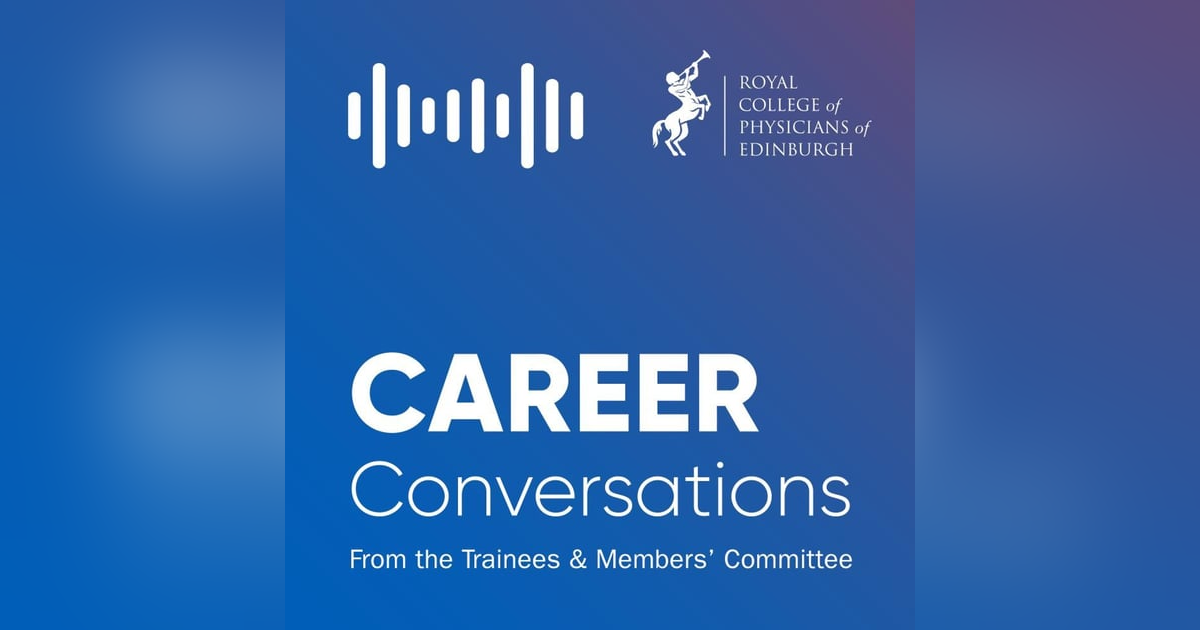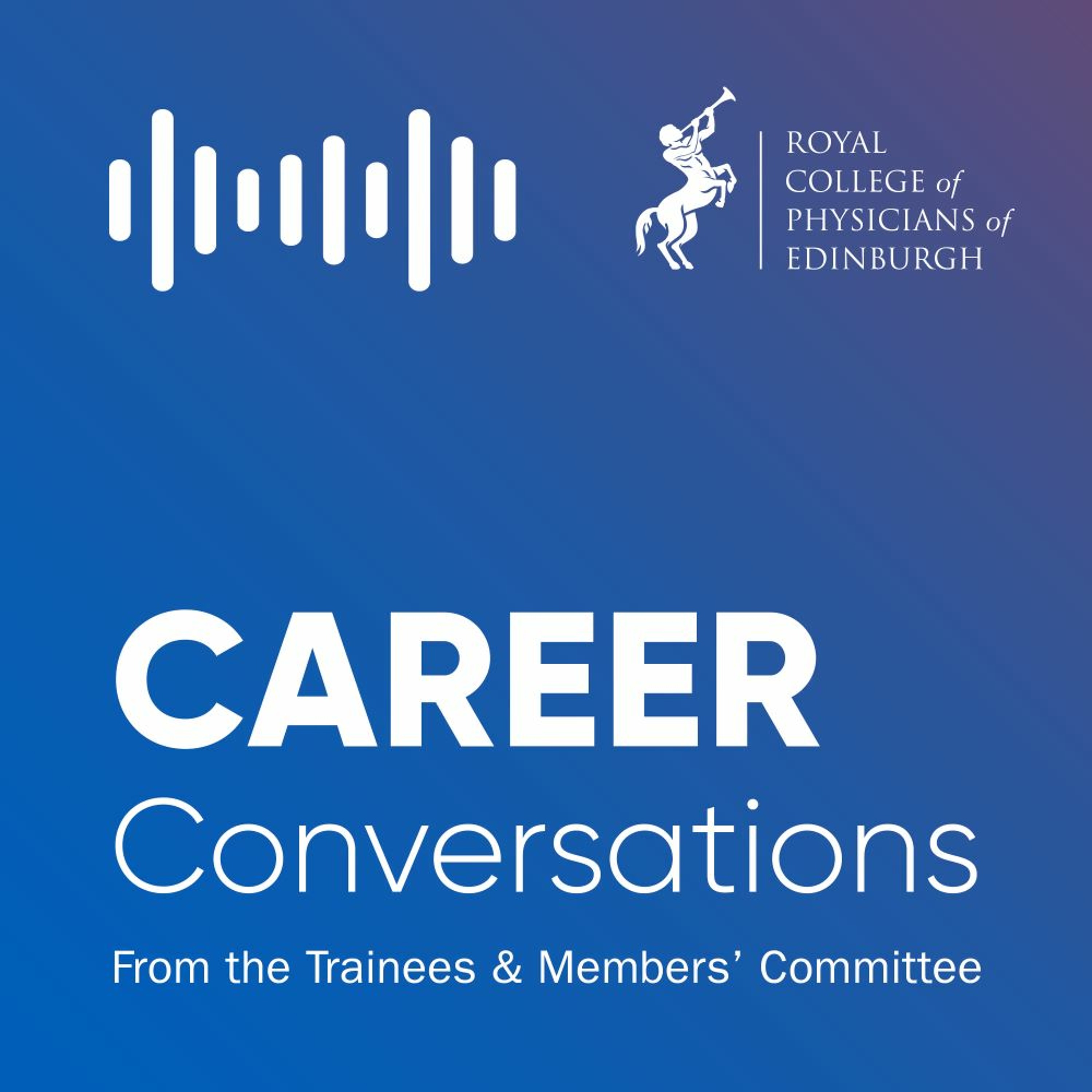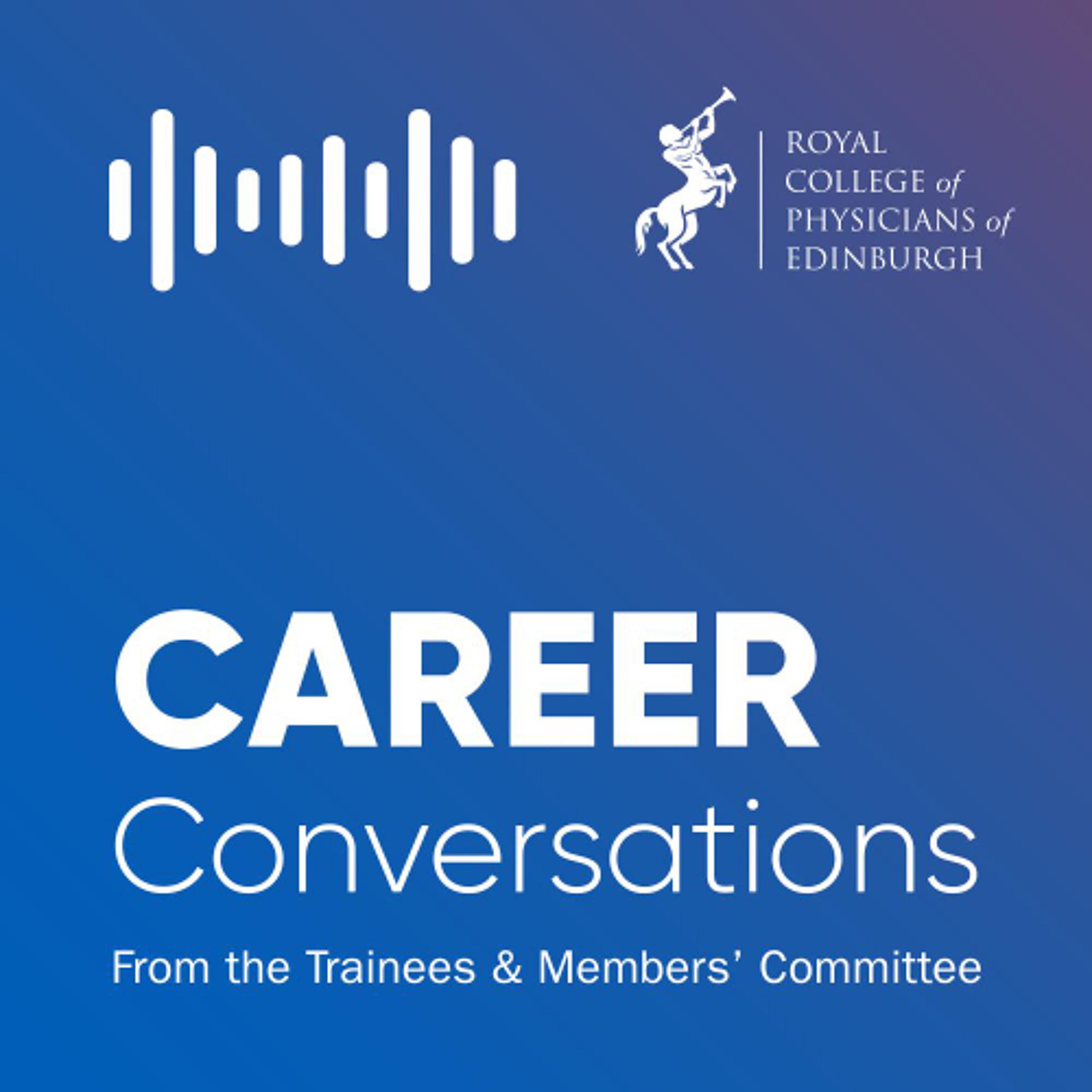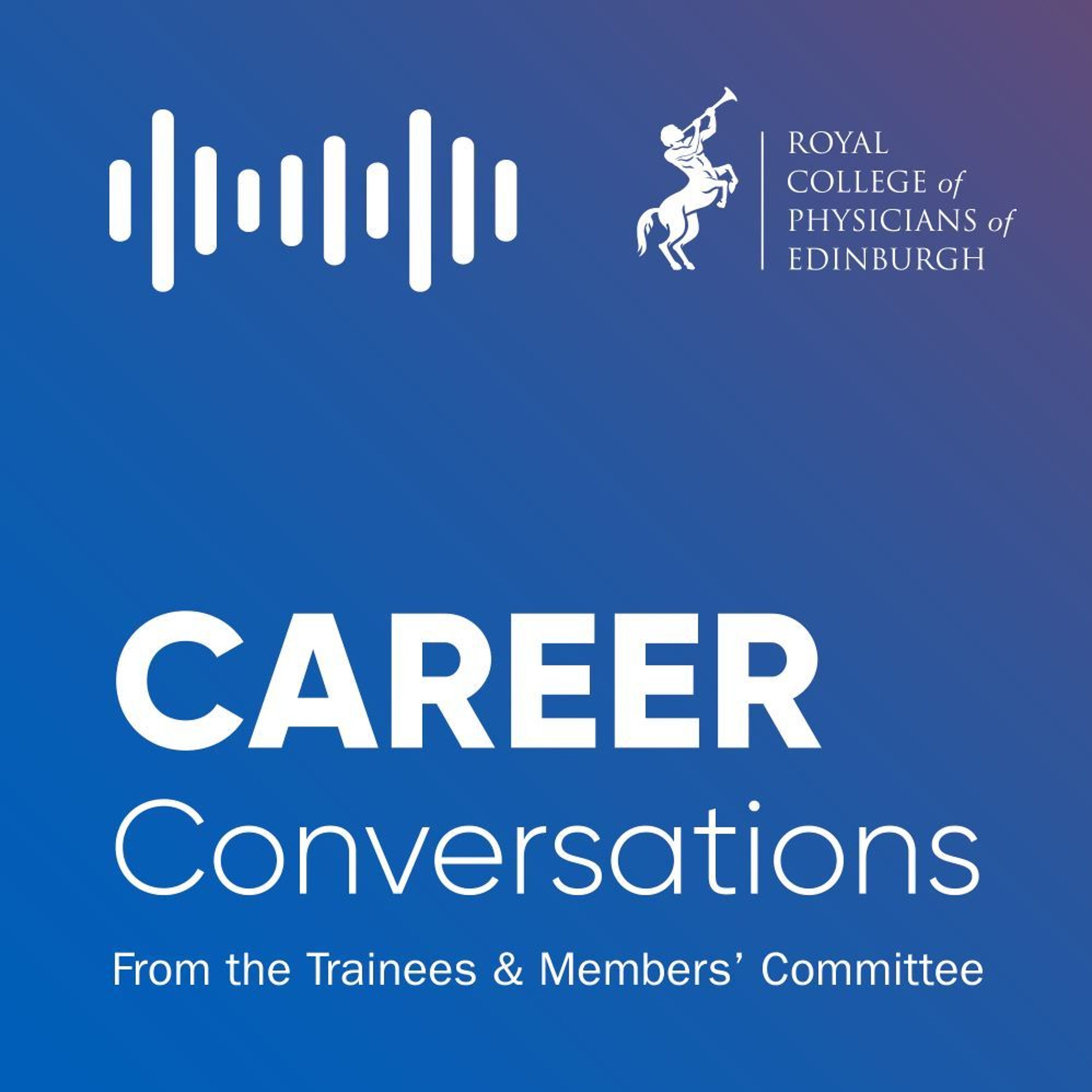IMT Application Process - 2025 Update (05 Nov 2025)

In this updated episode of Career Conversations, Dr Gabrielle Woodward-Smith discusses their experience of applying for Internal Medicine Training (IMT) using the Oriel system with Dr Marilena Giannoudi, and Dr Emma Spencer highlights important changes in the application process.
In this updated episode of Career Conversations, Dr Gabrielle Woodward-Smith discusses their experience of applying for Internal Medicine Training (IMT) using the Oriel system with Dr Marilena Giannoudi, and Dr Emma Spencer highlights important changes in the application process.
Useful Links
Oriel - Portal for Recruitment (UK)
Federation - Training Information
Disclaimer: Please always refer to official recruitment websites for the latest guidance as application dates and processes may differ to those described in this episode.
Update recording date: 28 October 2025 [original release: 10/2022]
Follow us
Upcoming RCPE events
Become an RCPE Member
Feedback
This podcast is from the Trainees & Members' Committee (T&MC) of the Royal College of Physicians of Edinburgh (RCPE).
This transcript has not been edited for accuracy.
Transcripts are available on popular podcast platforms.
Dr Emma Spencer (ES): Hi, my name is Emma and I'm a member of the Royal College of Physicians of Edinburgh's Trainee and Members committee. The podcast episode you're about to hear was originally recorded in 2022, but due to the many changes to the IMT recruitment process, we've decided to do a bit of an update for 2025. So, as well as my colleagues voices, you'll hear myself giving you some small tips and tricks on the new process throughout this podcast. I do hope you find it useful for your application.
Dr Marilena Giannoudi (MG): Hello everyone and welcome to another episode of Career Conversations, brought to you by the Royal College of Physicians of Edinburgh. My name is Doctor Marilena Giannoudi, and I am a cardiology registrar and a member of the Trainee and Members Committee. Today we are joined by Doctor Gabby Woodward-Smith, who's an IMT two doctor based in West Yorkshire. This is one of our new strand of episodes looking at careers and recruitment. So, in this episode, we're going to go through the IMT application and Gabby is going to share her experiences with us, having just applied last year. So Gabby, welcome and thank you for joining me. So, you obviously applied for IMT last year. Can you please tell me a bit about the process kind of at the start whilst you were planning your application?
Dr Gabby Woodward-Smith (GWS): Yeah. So at the start, I kind of think the first thing I did was sort of look at the timeline for things which you can get off the IMT website, just so I could kind of work out when I needed to start applying and make a note of all the important dates for the application that I was going through. And then kind of from there looked at how you actually apply, which is through the oral website, and then kind of made an account on there to kind of start the application process.
MG: Okay. And how long did you give yourself to actually complete the application.
GWS: I think I gave myself maybe I think I created the account, and then I had maybe a month before the deadline to kind of get everything in, but I tried to get it done sooner than the deadline, just so I knew it was all sorted and submitted. But I gave myself a bit of time to make sure that the application was okay, and I'd filled everything incorrectly before I submitted it.
MG: Okay. And then with regards to the application, you said it's all done via oral. And is that something that everyone needs to create a new account for? Or how does that work?
GWS: Yeah, I think I had to create a new account because my previous account. So, if you'd applied for Foundation programme in the UK that also uses oral, but I think my previous application was done through my university email address. So, my account had been deleted. So, I had to kind of start again, create a new account and go from there. But the website on the whole is quite easy to follow and quite self-explanatory. And if you've done foundation training in the UK, then a lot of people will be familiar with website for applying anyway.
ES: It is important to say if you're applying from outside the UK, you will now need to be on the GMC register in order to submit an application. Those not on the GMC register will not be eligible to apply.
MG: Just for our listeners, I will make sure that you have a link for the oral website for this podcast. So, Gabby, you obviously created the account. And then how is the application actually laid out?
GWS: So, it's laid out in sections. I think there's sort of five major sections of the application in total. So, on the website you have to search for the IMT application and then kind of start from there. And then it's laid out in sections. I think the first section was just a bit about personal information and employment history, where you've worked before, what jobs you've done in foundation or equivalent, and also if you've had any time out of training, what you've done in that time. So that was the first section. And then there was a section about references, previous training issues, anything you've had issues with. You could put all that in a section as well. And then the main section was kind of your supporting information, which sort of aligned with the point system for IMT recruitment.
MG: Okay, so are those the so-called white space questions? The ones with the main section that you're talking about. Is that something that you had to complete? Yes. Answering questions.
GWS: So, there was a few bits which aligned exactly with the points scoring. So, you had to then fill in the box what you've done with regards to that point. So for example, for any additional qualifications you'd had for undergraduate degrees or otherwise, there was a box below that to say what you'd done, what you'd been awarded in that degree, and how that had kind of helped through your medical training and medical career.
ES: It is important to clarify that the form has a self-assessment section, where you will score yourself against the self-assessment matrix on a number of domains. These domains include qualifications, publications, presentations, teaching, and quality improvement. There is then a section where you will be required to write your supporting information. This is justifications of why you've chosen this particular score for yourself.
MG: With regards to those questions, did you have to upload evidence with that as well?
ES: You no longer need to submit evidence for each domain and the score you've chosen for it. However, it is important that you have this evidence available should you be asked for it at a later stage in the application process.
MG: And I guess here is very important that anyone who is planning to apply for IMT should keep looking back at the website again, I'll post the link because what each job looks for will change from year on year. There were certainly changes last year, so it's really good to just keep an eye on the latest requirements that are needed of you. It is important to emphasize that this year, an additional five points have been added for a unique application to IMT or ACS Acute Medicine. Therefore, the shortlisting scores will be out a total of thirty-five, with thirty points being awarded for your self-assessment scoring and five points being awarded if you apply only to IMT or ACS Acute Medicine. This is to reward commitment to specialty. In addition, this year applications for Scotland and then England, Wales and Northern Ireland will be separate, and you will not be able to apply for both regions. Gabby, do you have any tips for kind of completing the white space questions?
GWS: I think just take a bit of time. And also mentioned to me, which really helped, was I sort of copied out the questions onto a separate word document. So, for people who aren't as familiar with oral, it times you out after. I think an hour. Obviously, there's quite a lot of questions, and you can probably spend about an hour on each page starting to fill things in. But if you haven't saved it in that time, then you lose everything. So, for me, writing it all out on a word document really helped. And then kind of copying it across when it came to it. But just take a bit of time. You've only got a limited number of words in each section, so you have to be quite concise and quite specific but also try and sell yourself at the same time. So, it did take me a bit longer to fill in those white space questions than any other part of the application.
MG: Did you discuss your questions with anyone? Did you ask for people to kind of have a look at your white space questions?
GWS: Yeah, so I ran them past my partner, who was also applying for different training program, and kind of asked if he could read through it to make sure it all made sense. And I think that's kind of useful for anything, really. I always like to get somebody else to proofread something that I'm uploading just to make sure there's no obvious spelling errors or, you know, sometimes I repeat words that I've not noticed. I think it's always useful to get a fresh pair of eyes to look at things, just to make sure it all makes sense, and that you kind of have answered the question.
MG: Yeah, I remember when I was applying, I definitely gave it to a few different people just to get their opinions. Yeah, and I think it's important to give it to someone who's not necessarily from your specialty as well.
GWS: Yeah, definitely
MG: the specialty that you're applying.
GWS: Yeah. And they can kind of relate things differently I think as well then. Because if they're looking at different specialty training program, then they're not necessarily going to know exactly what I might want. And then they can kind of make their own judgment on what you've answered.
MG: Yeah, yeah. Okay. So, you completed all of the oral application and that got sent off. And then was there a period where obviously you had to wait and then were you long listed for the job or how does it work after the application?
ES: After applications have closed, the system will check that you have not applied for two regions. The two region options are England, Northern Ireland and Wales, and then Scotland. If you have submitted an application for both those two regions, it will remove the first submitted application. Your shortlist score will then be calculated from your self-assessment score plus an additional five points. If you have applied for IMT or ACS Acute Medicine alone. There will be a cut off score which allows you to proceed to the next stage. The IMT website contains data on the cut off scores used in previous years. If you have scored above the cut off score, your application will proceed. At this stage, it will be checked for meeting the Basic Person specification. Eligibility criteria. These are the criteria that make you eligible to do the job of an IMT doctor. If these criteria are met and you have achieved the shortlisting score cut off. You will be invited to interview. There will then be a period of time where the interviews are carried out online. Towards the end of this period of time, you will be contacted and invited to make your programme preferences. There is lots of guidance as to how this happens on the IMT recruitment website. You will be able to see all of the programmes in the area which you have applied to. Remember, these two areas are England, Northern Ireland and Wales or Scotland. You will then need to rank all of those jobs which you would consider taking in order from your top choice to your bottom choice. You can leave jobs that you would not consider accepting in the not Wanted section. Once all interviews are complete, all applications in that area will be ranked based on their interview and portfolio or self-assessment score. Each candidate is then matched in order of ranking to their highest available program preference.
MG: So, I guess it's just about familiarizing yourself with oriole and actually really knowing what jobs you would be interested in applying for. Yeah, and obviously that's going to be different for everybody. But how did you make your decision with regards to ranking the jobs? Because I can imagine it's quite overwhelming when you're in that position to do that.
GWS: Yeah, there's quite a lot to go through. I think for me, I knew there were certain jobs that I wanted during my two years that I hadn't already worked in, and I was kind of thinking sort of going forward and being a medical registrar in the future, I'd like to have a bit of a broader base and make sure I've covered all the main specialities. So, I had a look and filtered jobs based on the ones that I wanted and ranked them higher than ones that didn't include them and kind of tried to do it that way. So having some sort of process makes it a bit easier. Mhm. So, I think for example I wanted a renal job because I'd never worked in renal. So, I kind of filtered all of the ones that had renal in and then sort of went from there and had a look at what other jobs were in and ranked it according to what I enjoyed in the other groups.
MG: Right, okay. And obviously with IMT, everyone now must have an ICU placement and the geriatrics placement. Can you see where that would lie within the job that you're applying for, or during the time that you see the jobs on the application? Is it just the specialties that you would be choosing to go into?
GWS: No. So, you can see the elderly and the ICU blocks in there as well. So, you get a list. They sort of split into I think different deaneries do it slightly differently. In West Yorkshire there's six jobs you rotate every four months like you did in the Foundation program. I think some deaneries do it slightly differently where you have a bit less time on intensive care, but you can see where that would slot in. So, all of them include for West Yorkshire. Anyway, all of them included elderly and intensive care. And then you had all other jobs sort of floating around, whether they were in the middle or either side. So, I kind of looked at those in terms of preferencing, I guess.
MG: That's great. And what would be your advice for anyone thinking about applying for IMT, both with regards to actually getting the application done, but also with regards to what it's like to be an IMT doctor?
GWS: I think in terms of getting the application done, definitely familiarizing yourself with the timeline. So, I know I went through that quite a lot and put dates in my diary and set reminders on my phone to make sure that I'd hit all of those deadlines to get the application in. And definitely leave yourself enough time to complete all those white space questions, because like I said earlier, they do take a bit more thinking. And then in terms of being an IMT, I guess it is good. I enjoyed having jobs that I wanted, but I don't think it necessarily matters all that much. So, I think, yes, preferencing is good, and if you can get a job that you think you want or job that you want experience in, that's good. But you know, you're on call a lot. You float around different departments while you're on call. So, you actually get a lot of experience in all of the specialties, regardless of what job you get. I think it was nice to do the jobs that I thought I wanted, but actually it didn't really make a huge amount of difference. During IMT one, in the grand scheme of things.
MG: Yeah, and I think that's a really important take home message actually, because we can all be quite upset if we don't get our top ranked choices. And if we think that, you know, it's going to have a long-lasting effect on our career. But ultimately, medicine is medicine. Unless you're going to go into a group to specialty, you're going to have to be a med reg. So actually, having very broad knowledge is very useful. And IMT is set up Specifically to give you the knowledge that you would need to be a good marriage.
GWS: Yeah. And I think, you know, even, you know, in elderly medicine, for example, and everybody has to do that. You see a lot of all different specialties, and you get experience dealing with all different sort of emergencies just in that specialty. So even if you didn't have a cardiology job, you're probably going to come across cardiology during one of your other rotations anyway.
MG: Definitely. Okay. Now I'm just a little bit conscious that I mentioned about group one and group two specialties. For anyone that's not aware, group one specialties are those in which to progress from IMT to higher specialty training, you would need to complete three years of IMT and group two specialties. You would apply for specialty training after two years of IMT. If you want to familiarize yourself more with this, then you can do that on the Higher Physician Training website. And again, I'll make sure that there are links available for that with this podcast. I think we've actually covered quite a lot of the application process today. Gabby, so thank you so much for taking the time to speak to me. We will continue with this podcast series, and we will have more podcasts on preparing yourself for the interview and what to do with regards to confirming your choices of job, or if you know you're thinking about changing jobs. So please stay tuned. But for now, I guess the only thing I have to do is. Thank you so much for your time, Gabby.
GWS: No thanks for having me.
ES: I hope you have found this updated episode helpful for your own application process. Remember, the IMT recruitment website has a lot of information which will be very helpful in your preparation process. I wish you all the best for your applications.















